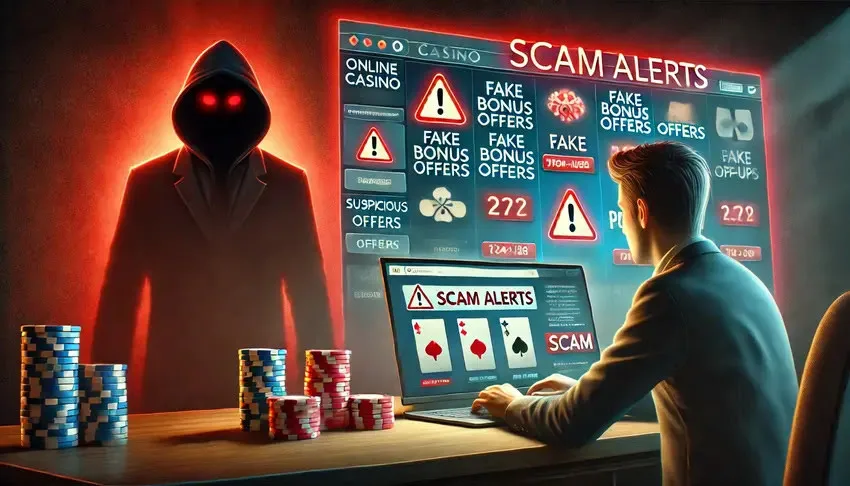How to Avoid Online Casino Scams: Safety Tips

The online gambling industry is thriving, offering players an exciting and potentially rewarding experience. However, alongside legitimate platforms, there are fraudulent online casinos designed to deceive players and steal their money. Scammers use various tactics, from rigged games to withholding withdrawals, making it crucial for players to distinguish between reputable and untrustworthy platforms. Ensuring your safety while playing online starts with recognising the red flags of dishonest casinos. These platforms often operate without proper licences, provide misleading bonus offers, and create obstacles when players attempt to withdraw their winnings. Understanding the risks and knowing how to spot them is the first step in protecting yourself from online casino scams. In this guide, we will explore the key indicators of fraudulent casinos, methods to verify a platform’s legitimacy, secure payment options, the significance of two-factor authentication, and what to do if you fall victim to an online casino scam. Armed with this knowledge, you can enjoy a safer and more secure gambling experience.
The Main Signs of Fraudulent Online Casinos
Identifying rogue online casinos requires vigilance and awareness of common warning signs. One of the most evident indicators is the absence of a valid gambling licence. Reputable casinos operate under licences from respected authorities, such as the UK Gambling Commission or the Malta Gaming Authority. If a platform does not display licensing information or provides unverifiable details, it is best to avoid it. Another red flag is unrealistic promotions and bonuses. Fraudulent casinos often lure players with offers that seem too good to be true, such as excessively high deposit bonuses with complex wagering requirements. These tactics are designed to entice players while making it nearly impossible to withdraw winnings. Always read the terms and conditions carefully before accepting any bonuses. Poor customer support is another hallmark of a scam casino. Legitimate platforms offer multiple ways to contact support, including live chat, email, and phone support. If a casino lacks responsive customer service or provides vague responses, it could indicate an unreliable operator. Testing support channels before depositing money can help determine a casino’s legitimacy. Delayed or denied withdrawals are a major warning sign. A trustworthy casino processes withdrawals efficiently and adheres to fair transaction policies. If a platform consistently delays payments or refuses to release funds under unclear terms, it is likely a scam. Checking player reviews on independent websites can provide insight into a casino’s payout reputation. Lastly, rigged or unfair games are a serious concern. Licensed casinos use Random Number Generators (RNGs) to ensure fair gameplay. However, fraudulent sites may manipulate game outcomes to prevent players from winning. If a casino lacks transparency about its software providers or fair play certifications, players should steer clear.

How to Check the Reliability of an Online Casino Before Playing
Before registering at an online casino, verifying its legitimacy is essential. Start by checking its licence and regulatory status. Trusted casinos clearly display their licensing details, and you can verify them on the respective regulatory authority’s website. If the information is missing or unverifiable, it is a significant red flag. Reading user reviews and expert opinions can also help assess a casino’s reputation. Independent platforms, such as gambling forums and review sites, provide valuable insights from real players. Pay attention to recurring complaints about withdrawals, customer support, or unfair gameplay, as these issues indicate potential problems. Evaluating the website’s security measures is another crucial step. A legitimate casino should use SSL encryption to protect players’ personal and financial information. Secure sites have a padlock icon in the address bar, indicating that the data is encrypted. Avoid platforms that do not prioritise security, as they may put your sensitive information at risk. Lastly, reputable casinos partner with well-known game providers and payment processors. If a casino features games from trusted developers like NetEnt or Microgaming and supports secure payment methods, it is likely a safer option. Researching the platform’s partners can help confirm its credibility.
Safe Deposit and Withdrawal Methods
Choosing secure payment methods is crucial when gambling online. The most reliable casinos offer multiple deposit and withdrawal options, including credit and debit cards, e-wallets, and cryptocurrencies. Each method has its advantages, but security should always be a priority. Credit and debit cards, such as Visa and Mastercard, are widely accepted and provide fraud protection. However, some players prefer e-wallets like PayPal, Skrill, or Neteller for faster transactions and enhanced security. These services act as intermediaries, reducing the risk of exposing personal banking details. Cryptocurrencies, such as Bitcoin and Ethereum, have gained popularity for their anonymity and security. Many reputable online casinos now accept crypto payments, offering fast and low-cost transactions. However, players should ensure that a casino is licensed before using digital currencies, as unregulated platforms may pose additional risks. Before making a deposit, reviewing the casino’s withdrawal policies is essential. A reliable casino provides clear information on processing times, fees, and limits. Avoid platforms that impose unreasonable delays or excessive charges on withdrawals, as these could indicate fraudulent intentions.
The Importance of Two-Factor Authentication and Account Protection
Securing your online casino account is just as important as choosing a legitimate platform. One of the most effective ways to enhance security is by enabling two-factor authentication (2FA). This additional layer of protection requires a second verification step, such as a unique code sent to your phone, reducing the risk of unauthorised access. Creating a strong, unique password for your casino account is also essential. Avoid using common passwords or reusing credentials from other websites. Instead, opt for a combination of letters, numbers, and symbols to strengthen security. Password managers can help generate and store complex passwords securely. Regularly monitoring account activity is another crucial step. Checking your transaction history for any suspicious activity can help detect unauthorised access early. If you notice any unusual transactions, contact customer support immediately and change your login credentials. Lastly, be cautious when using public Wi-Fi to access your casino account. Public networks are vulnerable to cyber threats, making it easier for hackers to intercept your data. If you must use public Wi-Fi, consider using a Virtual Private Network (VPN) for added security.
What to Do If You Are Scammed at an Online Casino
If you suspect that you have been scammed by an online casino, taking immediate action is crucial. Start by gathering evidence of fraudulent activity, such as screenshots of transactions, emails, and any correspondence with customer support. This documentation will be essential when filing a complaint. Next, report the issue to the casino’s licensing authority. If the platform operates under a regulatory body, you can submit a complaint outlining your concerns. Regulatory authorities can investigate the matter and take action against the casino if necessary. If your financial details have been compromised, contact your bank or payment provider immediately. They may be able to reverse fraudulent transactions or provide assistance in securing your account. In cases involving unauthorised credit card charges, disputing the transactions with your bank can help recover lost funds. Finally, share your experience on gambling forums and review sites to warn other players. Raising awareness about fraudulent casinos can help others avoid falling victim to similar scams. Additionally, consider only playing at well-established platforms with a proven track record of fair play and security.
